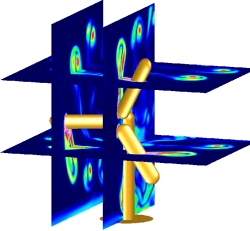 This looks useful! The partial differential equations (PDEs) we solve in my lab are the equations of motion for atoms in molecular dynamics. These are relatively easy to integrate numerically. Lots of labs work with harder PDE problems (like the response of metallic nanostructures to electromagnetic fields) that have difficult boundary conditions in complex geometries. Overture is an object-oriented code framework for solving partial differential equations (PDEs). It provides a portable, flexible software development environment for applications that involve the simulation of physical processes in complex moving geometry . It is implemented as a collection of C++ libraries that enable the use of finite difference and finite volume methods at a level that hides the details of the associated data structures. Overture is designed for solving problems on a structured grid or a collection of structured grids. In particular, it can use curvilinear grids, adaptive mesh refinement, and the composite overlapping grid method to represent problems involving complex domains with moving components. There are also utilities for building grids on CAD geometries and for building hybrid grids that can be used with applications that use unstructured grids.
This looks useful! The partial differential equations (PDEs) we solve in my lab are the equations of motion for atoms in molecular dynamics. These are relatively easy to integrate numerically. Lots of labs work with harder PDE problems (like the response of metallic nanostructures to electromagnetic fields) that have difficult boundary conditions in complex geometries. Overture is an object-oriented code framework for solving partial differential equations (PDEs). It provides a portable, flexible software development environment for applications that involve the simulation of physical processes in complex moving geometry . It is implemented as a collection of C++ libraries that enable the use of finite difference and finite volume methods at a level that hides the details of the associated data structures. Overture is designed for solving problems on a structured grid or a collection of structured grids. In particular, it can use curvilinear grids, adaptive mesh refinement, and the composite overlapping grid method to represent problems involving complex domains with moving components. There are also utilities for building grids on CAD geometries and for building hybrid grids that can be used with applications that use unstructured grids.
Categories
- Conferences (3)
- education (10)
- Fun (58)
- Meta (12)
- Open Access (10)
- Open Data (13)
- open science (34)
- Policy (48)
- Science (135)
- Software (633)
- Acoustics (3)
- Engineering (1)
- Physical (1)
- Speech Communication (2)
- Structural (1)
- Anthropology and Archaeology (3)
- Artificial Life (9)
- Astronomy (21)
- Aviation and Aeronautics (2)
- Chemistry (131)
- Analytical (4)
- Atmospheric (1)
- Biochemistry (6)
- Biophysical (3)
- Chemical Information (3)
- Crystallography (2)
- Electrochemistry (1)
- Molecule Viewers and Editors (39)
- Organic (2)
- Synthesis (1)
- Periodic Tables (3)
- Physical (1)
- Kinetics (1)
- Polymers (1)
- Spectroscopy (9)
- NMR (5)
- Surfaces (1)
- Theoretical and Computational (45)
- Cognitive Science (3)
- Neural Networks (2)
- Complex Systems (2)
- Computer Science (22)
- Algorithms And Computational Theory (2)
- Artificial Intelligence (4)
- Data Communication (4)
- Information Retrieval (1)
- Knowledge Discovery and Data Mining (3)
- Languages (1)
- Fortran (1)
- Measurement and Evaluation (1)
- Simulation and Modeling (2)
- Software Engineering (2)
- Symbolic and Algebraic Manipulation (1)
- Earth Sciences (19)
- Geology and Geophysics (5)
- Hydrology (5)
- Meteorology (1)
- Oceanography (3)
- Energy (3)
- Engineering (24)
- Forensics (2)
- Geography (12)
- Information Technology (1)
- Life Sciences (60)
- Bioinformatics (34)
- Ecology (5)
- Evolution and Population Genetics (3)
- Statistical (1)
- Theoretical (1)
- Genetics (9)
- Population (1)
- Medical Sciences (7)
- Physiology (2)
- Linguistics (2)
- Mathematics (108)
- Abstract Algebra (9)
- Combinatorics (1)
- Differential Equations (17)
- Fluid Dynamics (7)
- Ordinary (3)
- Partial (7)
- Dynamical Systems (4)
- Education (1)
- Geometry (3)
- Linear Algebra (26)
- Number Theory (6)
- Numerical Methods (5)
- Optimization (12)
- Probability (1)
- Set Theory (1)
- Statistics (8)
- Topology (1)
- Measurements and Units (3)
- Nanotechnology (2)
- Physics (30)
- Astrophysics (1)
- Atomic and Molecular (1)
- Computational (2)
- Condensed Matter (4)
- Dynamics (2)
- Fluid (1)
- High Energy (4)
- Magnetism (1)
- Materials (1)
- Nuclear (4)
- Optics (5)
- Plasma (1)
- Required Reading and Other Sites (25)
- Space (3)
- Tools (56)
- Numerical Libraries (8)
- Random Number Generators (2)
- Visualization (18)
- 2D Plotting (8)
- 3D Plotting (2)
- Acoustics (3)
- Uncategorized (4)
